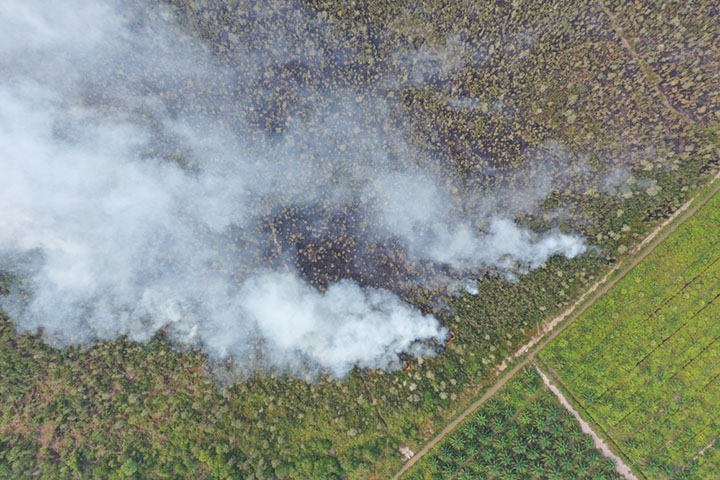Public values and sentiments regarding transboundary haze pollution in Singapore

Singapore—August 2019: Haze caused by forest fire and burning of plantations in Indonesia covers the Singapore downtown area. © Shutterstock.
Transboundary commons are broadly defined as the spatial arrangements for governing shared resources and coordinating responses to environmental threats and crises that traverse jurisdictions and property boundaries within as well as between nation-states.
In this context, haze pollution is a persistent problem of the transboundary environmental commons which is experienced by several countries in Southeast Asia. The impacts of haze-producing wildfires, mainly occurring in Indonesian peatlands, are felt especially acutely in Malaysia and Singapore, and can extend to other countries across the region.
Political efforts to address the haze crisis have been ongoing for over 30 years with little effect. The 2015 haze episode was similar in severity to a major event in 1997 and caused an estimated 100,000 excess deaths. Meanwhile, global demand for palm oil and pulpwood, the commodities commonly linked to haze-producing fires, continues to rise.
Diplomatic relations have also been disrupted by the haze, with the most recent episode in September 2019 being blighted by cross-border finger-pointing and the denial of individual responsibility by the governments of the three most affected countries.

Forest and peat fires typically take place in Sumatra and Borneo and are often linked to slash-and-burn practices to clear areas for palm cultivation and illegal logging. © Shutterstock.
A novel policy approach
As political solutions to this recurring environmental problem remain elusive, it is important for policymakers, the business community and civil society actors and organisations in Southeast Asia to continuously search for coordinated and comprehensive policy approaches to mitigate the haze.
Considering that Singapore, Indonesia and Malaysia have a long history of shared economic interests facilitated by sustained flows of people, technologies and investments within the region, our project, funded by the Toyota Foundation[1], aims to understand how the public in the three countries relate to the haze, and how this information can be effectively integrated into policy-making processes and inform political responses to the problem.
While past research by ourselves and others has uncovered aspects of public knowledge and attitudes towards the haze, these findings have yet to be connected to more deeply-held and stable underlying values (defined here as individual and collective judgements of what is important in life) and beliefs that shape how people and institutions think and behave (see Figure 1 below).
A vast psychological literature in the area of pro-environmental behaviour has established the important role that values play in explaining such behaviour (among others, Everard et al. 2016[2], Dunlap et al. 2000, Steg et al. 2014, Steg and De Groot 2012). A more complete understanding of how people behave in relation to the haze cannot be reduced to an analysis of people's knowledge of and attitudes towards the phenomenon, but needs consideration of their values too.

Figure 1: A visual representation of the cognitive hierarchy. Concepts towards the bottom are more stable and fewer in number than those towards the top. Adapted from Ives & Kendal, 2014
Using a combination of online surveys, followed by focus group discussions (FGDs) and in-depth interviews in Singapore, Malaysia and Indonesia, we collected data on how public values, as well as knowledge, attitudes and behaviours, relate to the haze problem. In broad terms, we explored values related to individual concerns—consumer, environmental and
religious values—and collective values related to politics and community.
In this article, we reflect on findings related to Singapore, focusing mainly on insights from our FGDs conducted in January 2020. The FGDs were held in collaboration with colleagues involved in the Transboundary Environmental Commons in Southeast Asia (TECSEA)[3]
programme of research at the Asia Research Institute (ARI), National University of Singapore. Two FGDs were run at ARI with a total of 12 anonymous participants whose diverse backgrounds were closely representative of Singapore’s demographics and evenly distributed between sexes. The participants included both Singaporean citizens and permanent residents who have been residing in Singapore at least since the 2015 haze episode.
Individual values
Despite haze-producing fires often being linked to unsustainable agribusiness practices, when it comes to consumer values, participants of our FGDs showed little awareness and minimal interest in sustainability labelling on consumer products, and even less so for specifically anti-haze product labels. A similar trend was found in FGDs conducted in Malaysia and Indonesia, representing a contrast to the data we collected via online surveys across all countries[4].
The link between individual consumer choices and the burning of peatlands appeared too distant and too indirect to affect the purchasing choices of our FGD participants, which may not be true for the survey respondents. This finding indicates that people and societies perceive their “connectedness” to the natural world in different ways[5].
The FGDs revealed that while people regularly consumed products that originated from sectors with direct linkages to haze-producing environments, such as palm oil (a form of ‘material connection’ to these areas), this was rarely accompanied by a deep understanding about the causes and consequences of haze (a cognitive connection to nature).
As might be expected, price was the primary concern when it came to consumption for most participants. This finding suggests that the labelling strategies of organisations such as the Singapore Environment Council (SEC) and PM Haze have produced mixed results by promoting haze awareness and haze-preventive activities in the business sector. For example, PM Haze has achieved public relations successes in its campaigns to convince local eateries and food retailers to convert to RSPO (Roundtable on Sustainable Palm Oil)-certified palm oil products.
The SEC, too, has mainly targeted businesses, as shown in 2015 when SEC’s temporary revocation of its green label for companies suspected of causing forest fires in Indonesia led to popular supermarket chains removing these products from their shelves. However, much work remains to be done in persuading individual consumers to change their purchasing choices.
Although more than half our survey respondents considered protecting the environment and conserving nature to be a guiding principle (value) in their lives, the FGD participants articulated a different set of values. They emphasised that along with price, commercial brand recognition is prioritised by Singapore consumers over ethical concerns and sustainability certifications.
This disjuncture between participants’ consumer and environmental values could perhaps be due to Singapore’s approach to environmentalism. Our participants emphasised that they saw themselves (and other Singaporeans) as “followers” of rules and norms set by the government. Collective environmental efforts such as recycling and not littering may, therefore, be more the result of well-enforced laws and regulations rather than reflective of any underlying or deeply held environmental values. Repeating a striking phrase, a participant noted that Singapore was “a cleaned country” rather than a clean country.
When the discussion turned to religious values and the environment, our Singapore-based FGD participants tended to subscribe to the view that “Singapore is a secular country” and ”Singaporeans are practical” in relation to questions about correlations between religion and the haze.
For these respondents, “religion is about morals and ethics, not the environment”. Some individuals argued that “haze is started by irresponsible companies, what has that to do with my belief and God?”. This was consistent with our survey findings in which Singaporean-based respondents were the least likely compared to the other countries’ respondents to link aspects of religion to the haze Some surmised that this could be due to the Muslim-majority communities in Malaysia and Indonesia, compared to Singapore’s multi-religious demographic composition, which includes substantial atheist and agnostic populations of “free thinkers”.
This observation is noteworthy because while there is a growing appreciation for the relevance of religion to environmental sustainability, its potential to mobilise effective haze responses can, and often does, vary considerably within and between individual countries.
Collective values
The Singapore-based discussion of political values indicated that, in general, responsibility for the haze and the environment was not attributed to individuals. Rather, people saw businesses as primarily responsible for causing the haze. Thus, the onus to solve this problem should lie with them, and interestingly, with the Indonesian government.
Some FGD participants felt that among the three countries, Singapore is the least responsible for causing the haze, but despite this, seems to be doing the most in the way of formulating policy responses. Reflecting this sentiment, one participant explained that “I hardly hear anything done in Indonesia and Malaysia. At least the Singaporean government has done something in banning, boycotting or fining the companies”.
Indeed, the Singaporean government has been the main proponent of the ASEAN (Association of Southeast Asian Nations) Haze Monitoring System to further operationalise the 2013 ASEAN Agreement on Transboundary Haze Pollution. In 2014, Singapore also became the first country in ASEAN to enact a Transboundary Haze Pollution Act. Public approval of these actions was palpable during one FDG session: “We hold this view that rather than talk and blame, let’s just do something. Be practical.” On the one hand, it could be perplexing why the state is putting in so much effort when its citizens do not actively call for it. On the other hand, it could be precisely because of the Singapore state’s proactive stance that public trust is high, resulting in its citizens feeling absolved of individual responsibility in dealing with environmental issues.
We also attempted to gauge the extent to which our FGD participants experienced a sense of belonging to a wider community, particularly with regards to their country’s membership in the region-wide ASEAN community.
Individual perspectives highlighted the acute awareness of Singapore residents about geopolitics and the belief that “Singapore needs to maintain its relationship with its neighbours, so they cannot push too much” when it comes to solutions to the haze because “It takes a lot of sensitivity, tact, and negotiation to solve problems between multiple countries.” It was also mentioned that “Singapore is very small [and] it needs to be friendly to its neighbours for both economic and defence purposes.”
Most participants agreed that bilateral negotiations would be more effective than diplomacy at the ASEAN level. This was consistent with the findings of our survey results, where a majority of respondents were sceptical that ASEAN was the correct international forum through which to pursue policy solutions to the haze.
FGD respondents reflected that this may be due to uneven political dynamics between member states, with many member countries often unaffected by the haze. They also noted the ongoing asymmetrical geopolitical power relations within the grouping which could also work to the disadvantage of less developed member states.
However, it was also pointed out that “we, the general public, don’t know what’s happening behind closed doors”, which could at least partially explain the overall sense of apathy toward environmental governance in general and the haze problem in particular amongst people living in Singapore.
Psychological constructs of transboundary commons
Overall, the surveys, FGDs and interviews conducted in Singapore were useful in distilling the sentiments of Singaporean citizens and permanent residents about their individual and collective (lack of) responsibility for the regional haze problem. They were also essential for contextualising these perceptions with our parallel research in Malaysia and Indonesia.
Cross-border burden-sharing is an important consideration in addressing the transboundary haze problem because even countries that do not produce the pollution directly can contribute indirectly through consumer behaviour, corporate investments, and activities in haze-producing countries. Studying perceptions, beliefs, and values can contribute to this understanding of the economic and ecological interconnectedness of haze and how the idea of a “transboundary environmental commons” in Southeast Asia is (or may be) constructed.
These insights also illustrate the value of approaching such transboundary environmental commons problems through more rounded policy approaches that harness the potential of “bottom-up” public perspectives in transforming unsustainable ecological behaviours. Such holistic approaches are in line with a recent UNESCAP report which calls for “the need to transform economic incentives, industrial and urban development systems, and land-use planning and management processes to value forest resources more greatly, and promote [public] practices that sustain and maintain ecosystem services…to address the root causes of pollution and support more environmentally sustainable approaches to development.”
Our findings attest to the importance of multi-stakeholder approaches to addressing recurring haze crises. Everyone, throughout consumption chains and supply chains, plays a role - from consumers, to consumer-facing businesses, to consumer goods manufacturers, to suppliers of raw material, to planters.
Consistent government engagement and collaboration with wider communities across different segments of society—researchers, civil society, businesspeople, and even religious leaders—have a role to play in advancing public education, public participation, and accountability in policymaking as a much-needed step in the direction of more sustainable ecological behaviours.
[1] This research is supported by the Toyota Foundation Grant Program 2017 through our project “The Southeast Asian haze crisis: Public values as a pathway towards constructive cross-border sentiments and engagement” (D17-R-0421). Any opinions, findings and conclusions or recommendations expressed in this material are those of the authors and do not reflect the views of the Toyota Foundation.
[2] Everard et al (2016) summarises that there are two groups of factors influencing the link between values and behaviours: i) external, contextual factors, including demographic (e.g. age and gender), socio-cultural (e.g. prevailing norms), economic (e.g. incentives or disincentives), and political and institutional factors (e.g. infrastructure to enable pro-environmental behaviour); and ii) internal, individual factors, including attitudes, values and beliefs relating to the environment, compared to other competing non-environmental motives, personal capabilities (e.g. knowledge and skills, disabilities), resources (e.g. time and money), habits, emotional involvement with environmental problems and a belief that it is possible to bring about change through an individual's action.
[3] TECSEA is supported by the Ministry of Education, Singapore, under its Social Science Research Council (SSRC) grant "Sustainable Governance of the Transboundary Environmental Commons in Southeast Asia" (MOE2016-SSRTG-068). Any opinions, findings and conclusions or recommendations expressed in this material are those of the authors and do not reflect the views of the Ministry of Education, Singapore.
[4] Across all countries, a majority of the survey respondents indicated that they check sustainability labels on products. Research has suggested that survey respondents in Asia tend to have higher levels of acquiescence (generally defined as the reluctant acceptance of something without protest, or in this context, answering survey questions according to how they think they should respond) than respondents in Western nations, which may explain these results. This revealed the value of the FGD method when used to triangulate against survey data. The scepticism of FGD respondents towards this survey finding helped to moderate our interpretations of such results.
[5] Many scholars have raised concerns that human society as a whole has become ‘disconnected’ from the natural world, and we need to ‘reconnect’ to nature for both the good of the planet and our health and wellbeing. Indeed, some have argued that direct interactions with nature, or physical connections, are lacking in urban Singapore and Kuala Lumpur. However, these different types of nature connections might occur together or be disassociated from one another.















